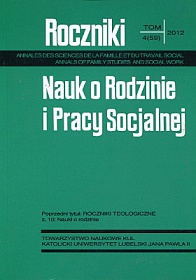Moral Dilemmas of Communication in the Context of Pediatric Palliative Care in the Light of the Research of the Parents and the Medical Staff
Abstract
The aim of the article is to describe the moral obligation connected with the rule of the truth telling in the context of the pediatric palliative care. The practical aim is to answer the question about proper attitude of the family and the medical staff toward a dying child. The answers take into account the right of the child to the truth about his or her physical state. The theoretical reflections are confronted with the empirical survey among the physicians and the parents. The answers for the six questions of the questionnaire illustrate the practice of the doctors who deal with the sick children and their families and compare the practice with the opinions of the parents.
References
Brody H.: Ethical Decisions in Medicines, Boston 1976.
Brusiło J.: Lekarz wobec kresu ludzkiego życia, Kraków 2004.
Fujii Y. [i in.]: Analysis of the Circumstances at the End of Life in Children with Cancer: A Single Institution's Experience in Japan, „Pediatrics International” 45(2003), nr 1, s. 54-59.
Gretkowski A.: Ból i cierpienie, Płock 2003.
Hartman J.: Bioetyka dla lekarzy, Warszawa 2009.
Hilden J. M., Watterson J., Chrastek J.: Tell the Children, „Journal of Clinical Oncology” 18(2000), nr 17, s. 3193-3195.
Komp D. M.: I dziecko będzie je prowadzić. Dzieci z nowotworem uczą, jak mieć nadzieję, Warszawa 1997.
Kośmicki M.: Pacjent u schyłku XX wieku, Kielce 1997.
Kreicbergs U., Valdimarsdottir U., Onelov E., Henter J., Steineck G.: Talking About Death with Children who Have Severe Malignant Disease, „The New England Journal of Medicine” 2004, nr12(351), s. 1175-1186.
McCallum D. E., Byrne P., Bruera E.: How Children die in Hospital, „Journal of Pain and Symptom Management” 20(2000), nr 6, s. 417-423.
Potts S.: Everylife: Death, Bereavement and Life Through the Eyes of Children, Parents and Practitioners, Wiltshire 2005.
Potts S., Fairbairn G.: Spiritual Needs in Pediatric Palliative Care: Communicating Ethically with Dying Children, s. 2 (materiały z seminarium zudziałem prof. G. Fairbairn, KUL 28 kwietnia 2009 r., arch. autora artykułu).
Wendler D. S.: Assent in Pediatric Research: Theoretical and Practical Considerations, „Journal of Medical Ethics” 32(2006), s. 229-234.
Wieczorek W.: Znaczenie życia sakramentalnego w duchowym rozwoju rodziny, [w:] Rodzina wobec współczesnych wyzwań społeczno-kulturowych, red. J. Gorbaniuk, B. Parysiewicz, Lublin 2009, s. 153-163.
Wieczorek W.: Moralne aspekty prawa do prawdy i autonomii pacjenta wkontekście pediatrycznej opieki paliatywnej, [w:] Wybrane aspekty pracy socjalnej w warsztacie pracownika socjalnego – doświadczenia polsko-niemieckie, Lublin–Eichstätt–Ingolstadt 2010, s. 123-144.
Wolfe L.: Discussing Death with a Dying Child, „Cancer Journal for Clinicians” 55(2005), nr 1, s. 2- 3.
Wróbel J.: Człowiek i medycyna. Teologicznomoralne podstawy ingerencji medycznych, Kraków 1999.

